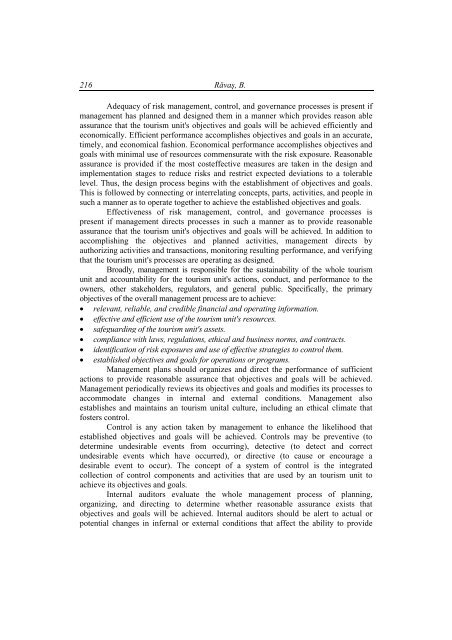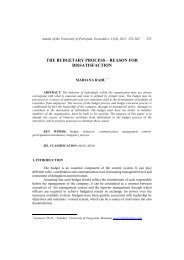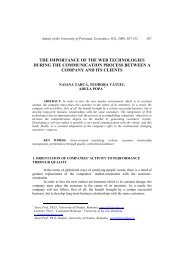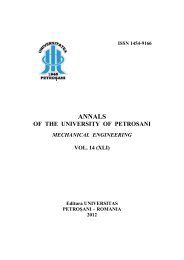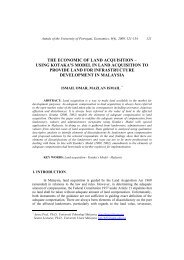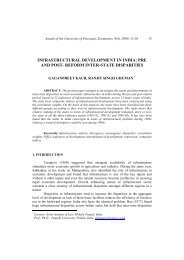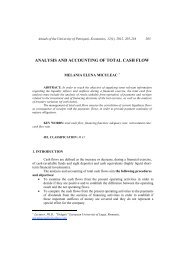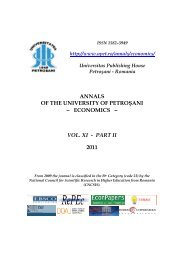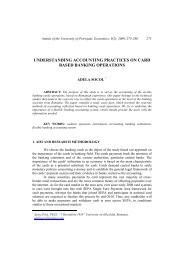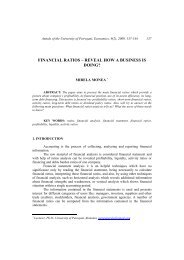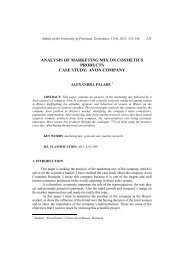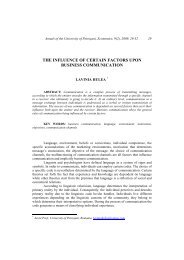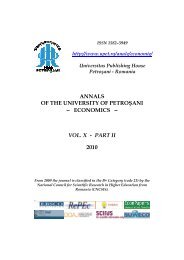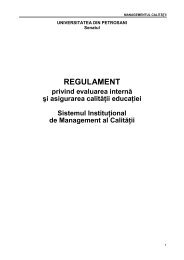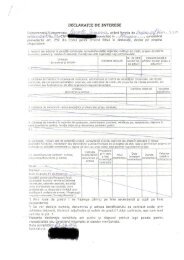annals of the university of petroÅani â¼ economics â¼ vol. xi - part i ...
annals of the university of petroÅani â¼ economics â¼ vol. xi - part i ...
annals of the university of petroÅani â¼ economics â¼ vol. xi - part i ...
You also want an ePaper? Increase the reach of your titles
YUMPU automatically turns print PDFs into web optimized ePapers that Google loves.
216 Răvaş, B.<br />
Adequacy <strong>of</strong> risk management, control, and governance processes is present if<br />
management has planned and designed <strong>the</strong>m in a manner which provides reason able<br />
assurance that <strong>the</strong> tourism unit's objectives and goals will be achieved efficiently and<br />
economically. Efficient performance accomplishes objectives and goals in an accurate,<br />
timely, and economical fashion. Economical performance accomplishes objectives and<br />
goals with minimal use <strong>of</strong> resources commensurate with <strong>the</strong> risk exposure. Reasonable<br />
assurance is provided if <strong>the</strong> most costeffective measures are taken in <strong>the</strong> design and<br />
implementation stages to reduce risks and restrict expected deviations to a tolerable<br />
level. Thus, <strong>the</strong> design process begins with <strong>the</strong> establishment <strong>of</strong> objectives and goals.<br />
This is followed by connecting or interrelating concepts, <strong>part</strong>s, activities, and people in<br />
such a manner as to operate toge<strong>the</strong>r to achieve <strong>the</strong> established objectives and goals.<br />
Effectiveness <strong>of</strong> risk management, control, and governance processes is<br />
present if management directs processes in such a manner as to provide reasonable<br />
assurance that <strong>the</strong> tourism unit's objectives and goals will be achieved. In addition to<br />
accomplishing <strong>the</strong> objectives and planned activities, management directs by<br />
authorizing activities and transactions, monitoring resulting performance, and verifying<br />
that <strong>the</strong> tourism unit's processes are operating as designed.<br />
Broadly, management is responsible for <strong>the</strong> sustainability <strong>of</strong> <strong>the</strong> whole tourism<br />
unit and accountability for <strong>the</strong> tourism unit's actions, conduct, and performance to <strong>the</strong><br />
owners, o<strong>the</strong>r stakeholders, regulators, and general public. Specifically, <strong>the</strong> primary<br />
objectives <strong>of</strong> <strong>the</strong> overall management process are to achieve:<br />
relevant, reliable, and credible financial and operating information.<br />
effective and efficient use <strong>of</strong> <strong>the</strong> tourism unit's resources.<br />
safeguarding <strong>of</strong> <strong>the</strong> tourism unit's assets.<br />
compliance with laws, regulations, ethical and business norms, and contracts.<br />
<br />
<br />
identification <strong>of</strong> risk exposures and use <strong>of</strong> effective strategies to control <strong>the</strong>m.<br />
established objectives and goals for operations or programs.<br />
Management plans should organizes and direct <strong>the</strong> performance <strong>of</strong> sufficient<br />
actions to provide reasonable assurance that objectives and goals will be achieved.<br />
Management periodically reviews its objectives and goals and modifies its processes to<br />
accommodate changes in internal and external conditions. Management also<br />
establishes and maintains an tourism unital culture, including an ethical climate that<br />
fosters control.<br />
Control is any action taken by management to enhance <strong>the</strong> likelihood that<br />
established objectives and goals will be achieved. Controls may be preventive (to<br />
determine undesirable events from occurring), detective (to detect and correct<br />
undesirable events which have occurred), or directive (to cause or encourage a<br />
desirable event to occur). The concept <strong>of</strong> a system <strong>of</strong> control is <strong>the</strong> integrated<br />
collection <strong>of</strong> control components and activities that are used by an tourism unit to<br />
achieve its objectives and goals.<br />
Internal auditors evaluate <strong>the</strong> whole management process <strong>of</strong> planning,<br />
organizing, and directing to determine whe<strong>the</strong>r reasonable assurance e<strong>xi</strong>sts that<br />
objectives and goals will be achieved. Internal auditors should be alert to actual or<br />
potential changes in infernal or external conditions that affect <strong>the</strong> ability to provide


